Elizabeth Walsh October 2012 Cherkasy State Business College

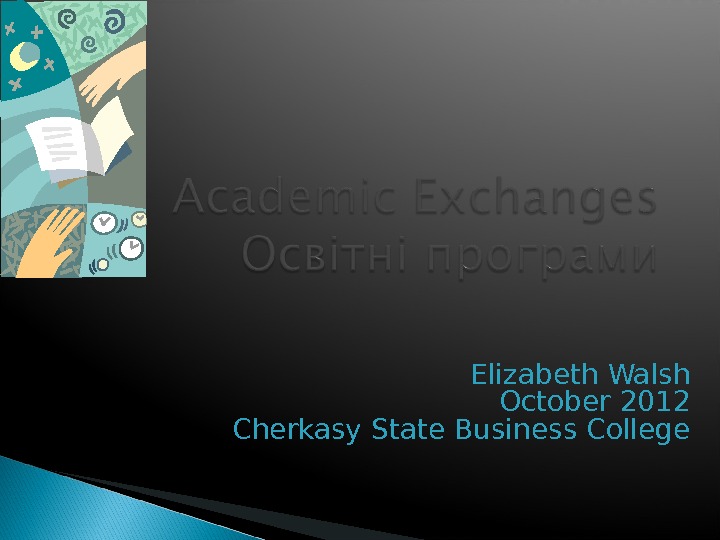
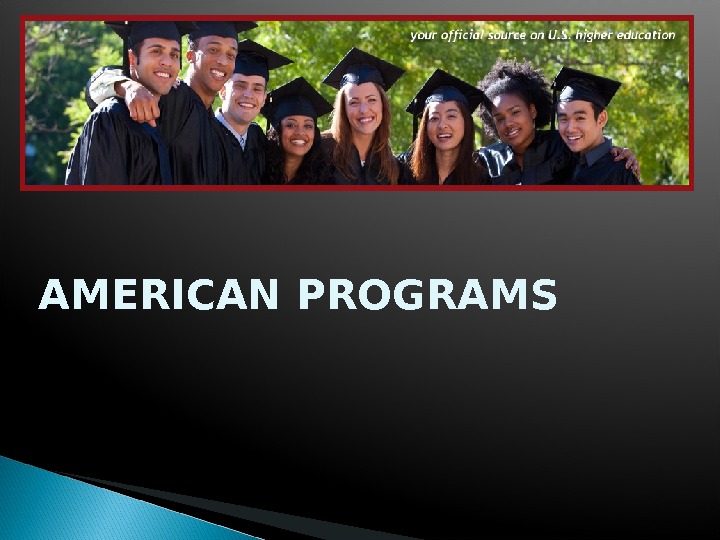
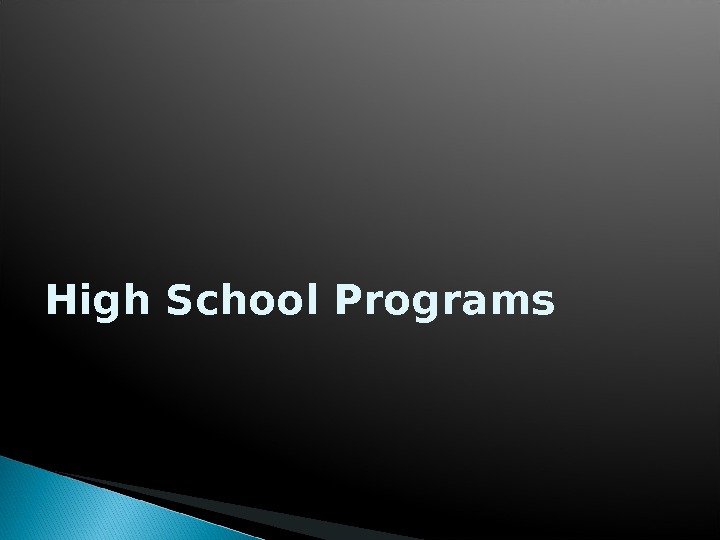
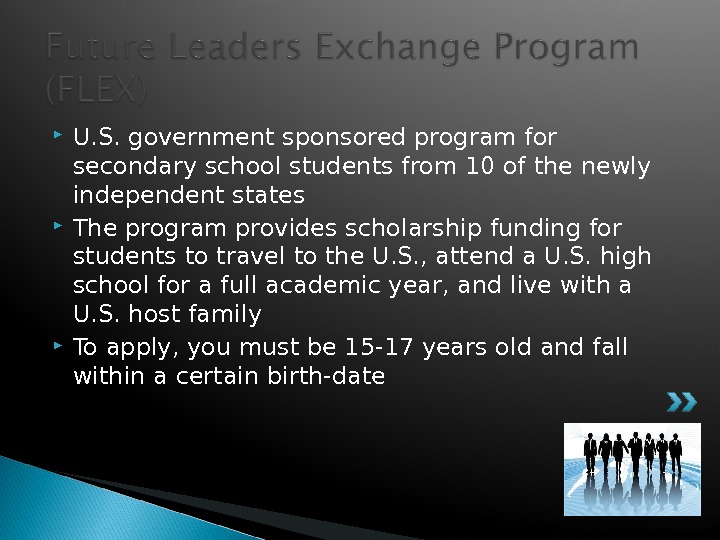
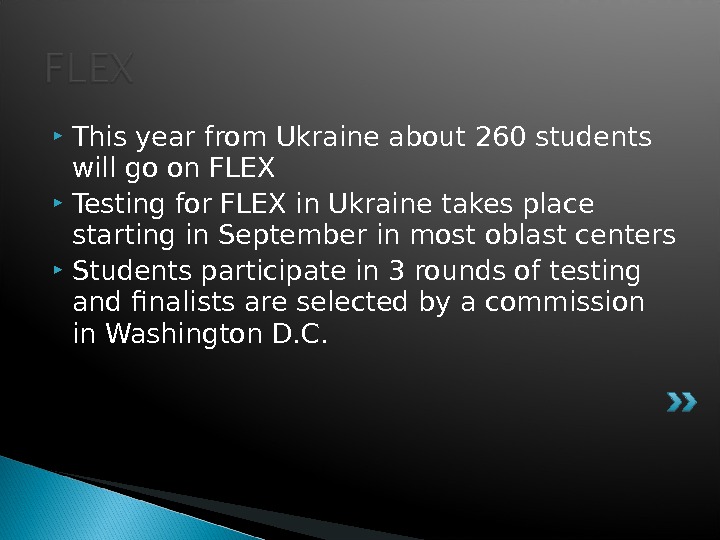
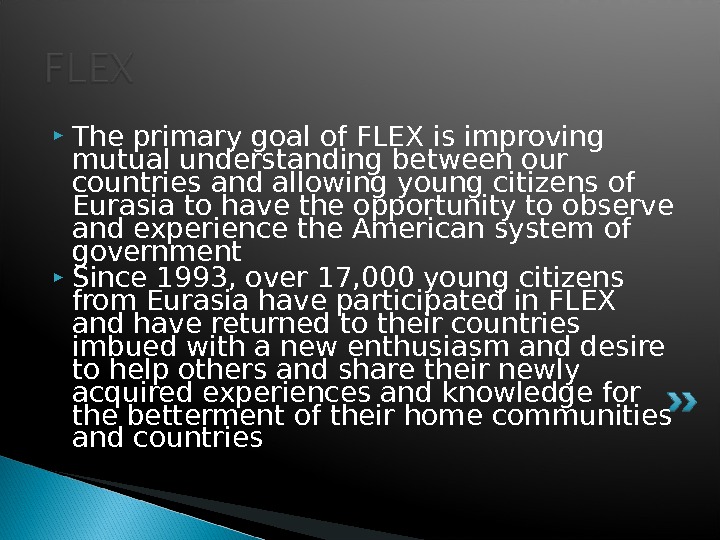
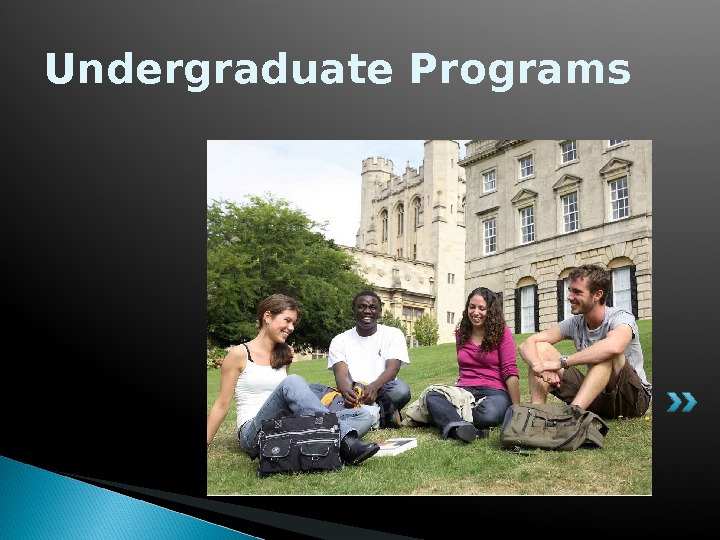
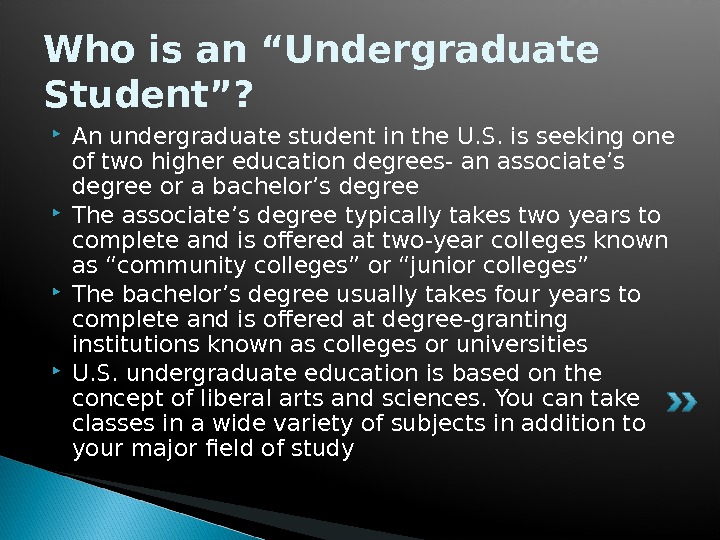
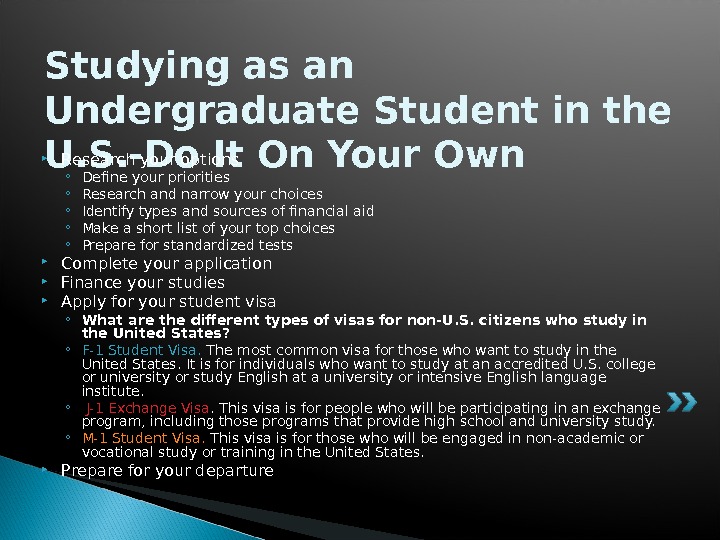
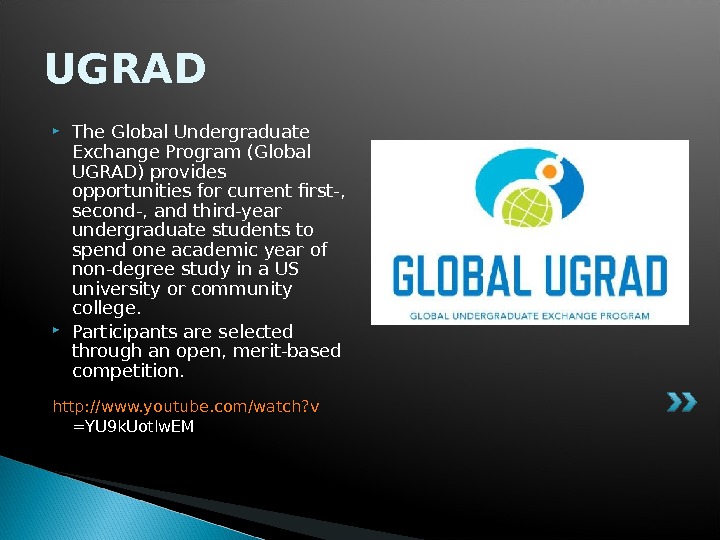
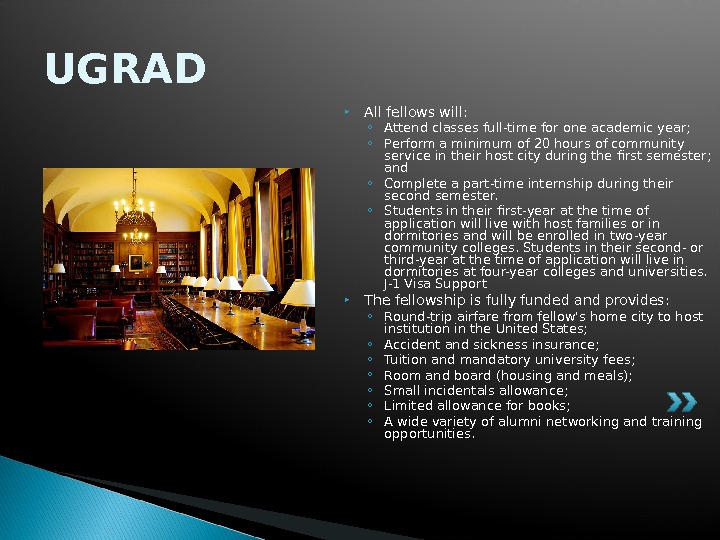
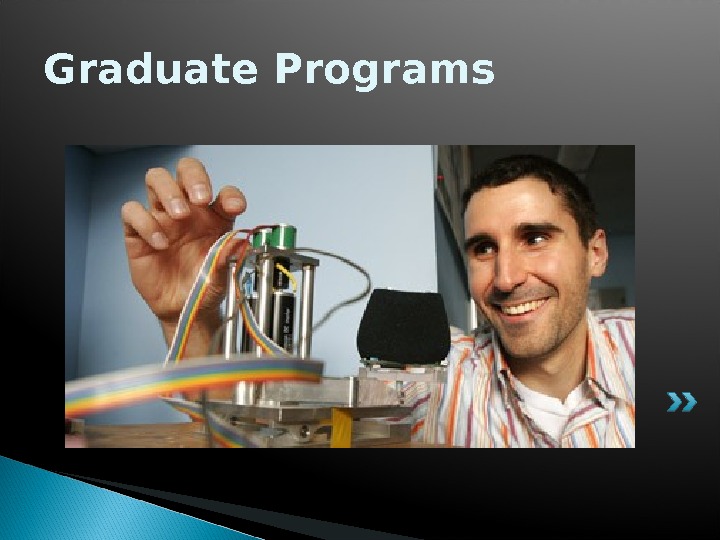
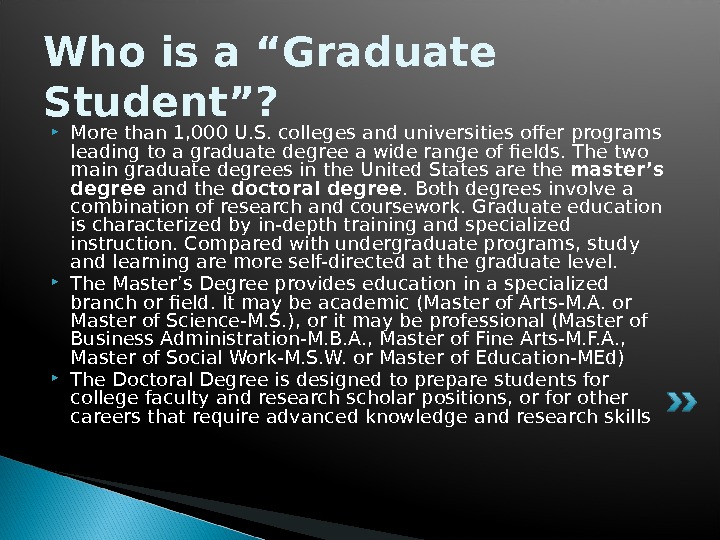
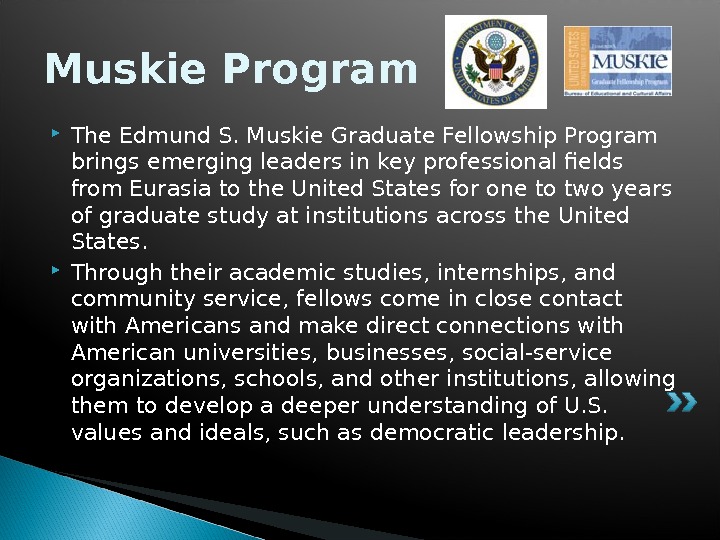
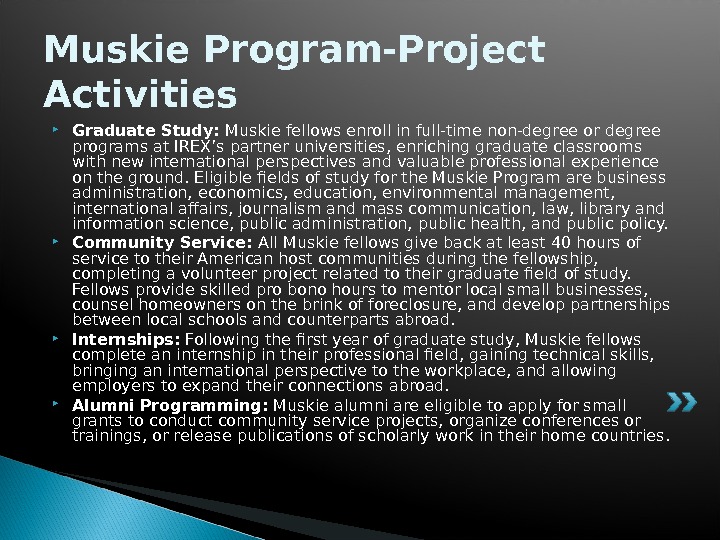
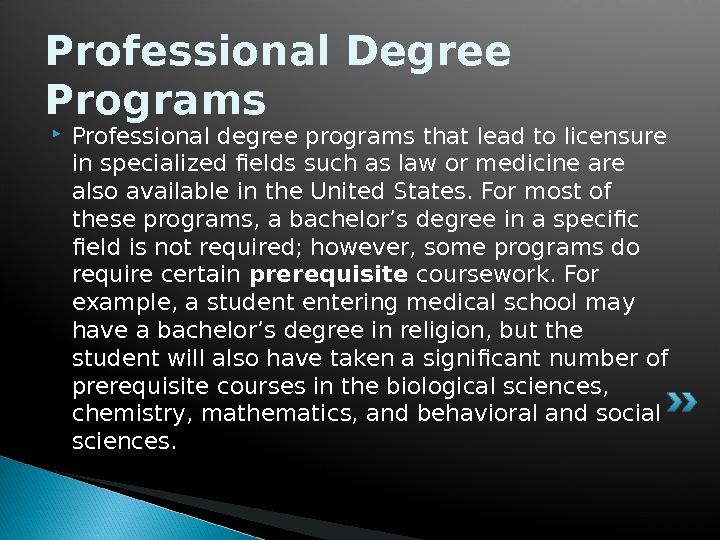
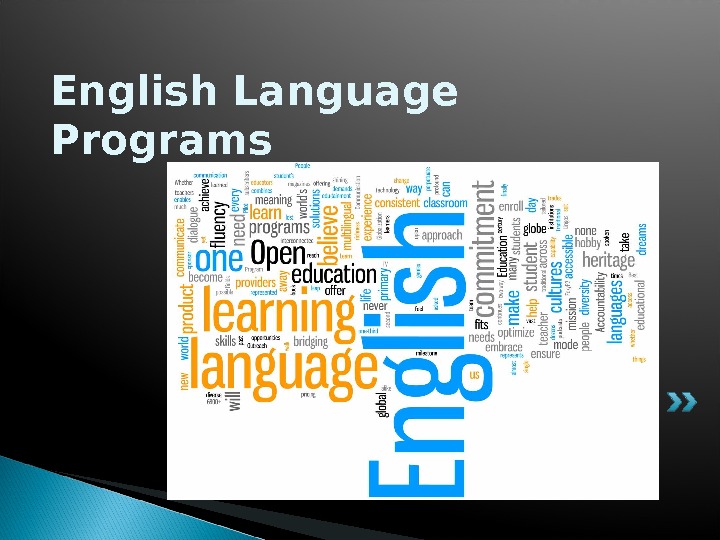
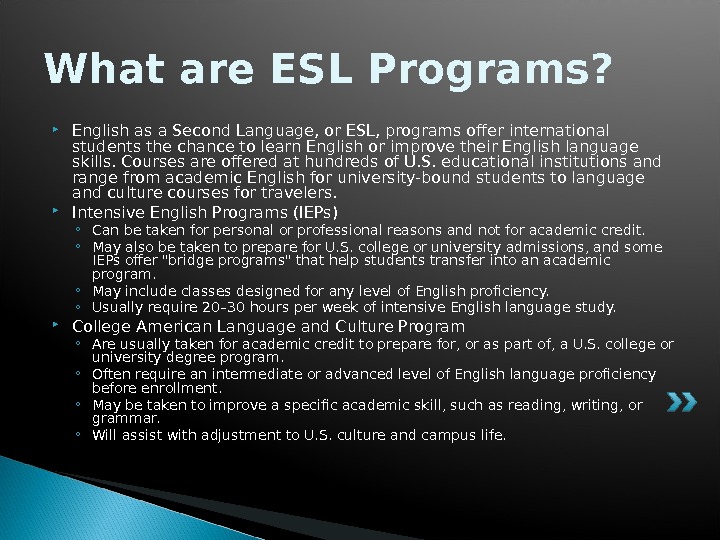
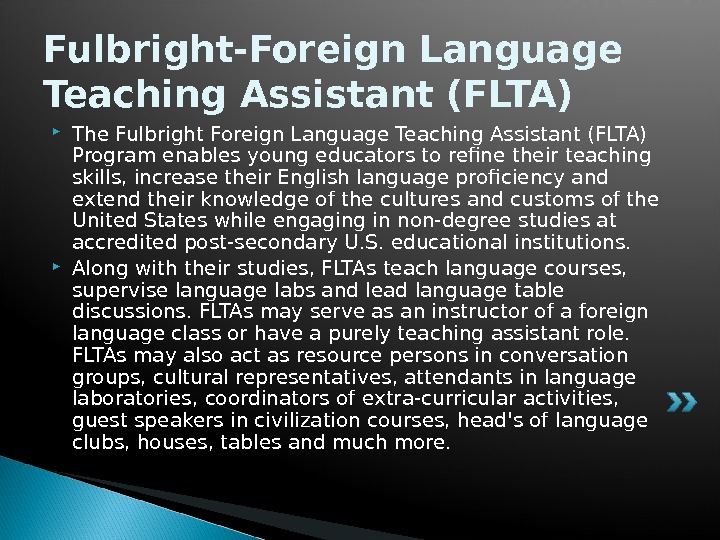
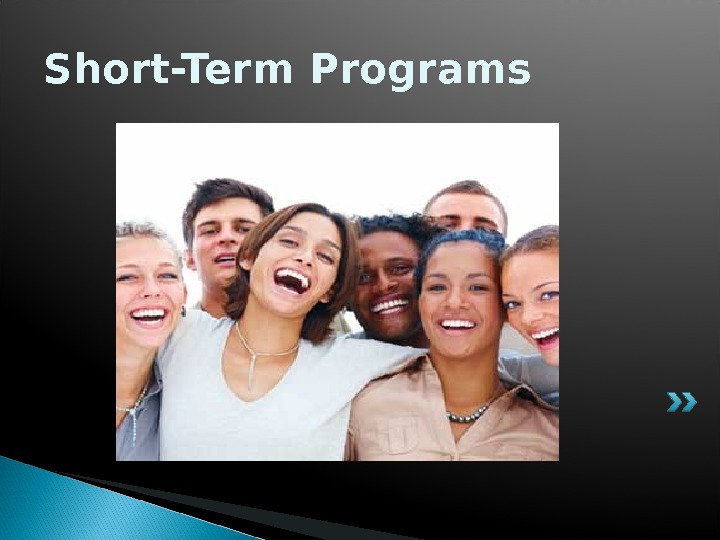
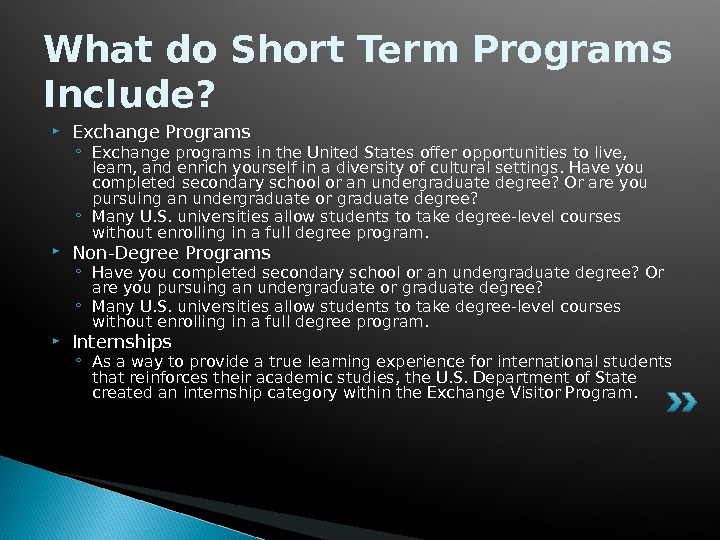
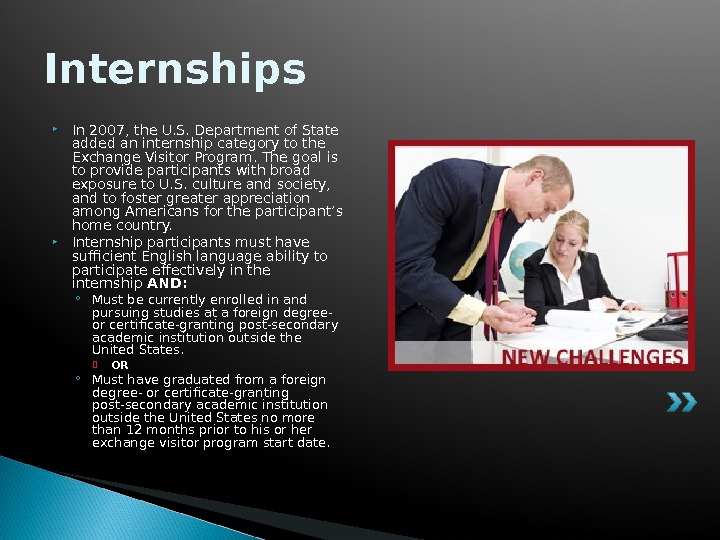
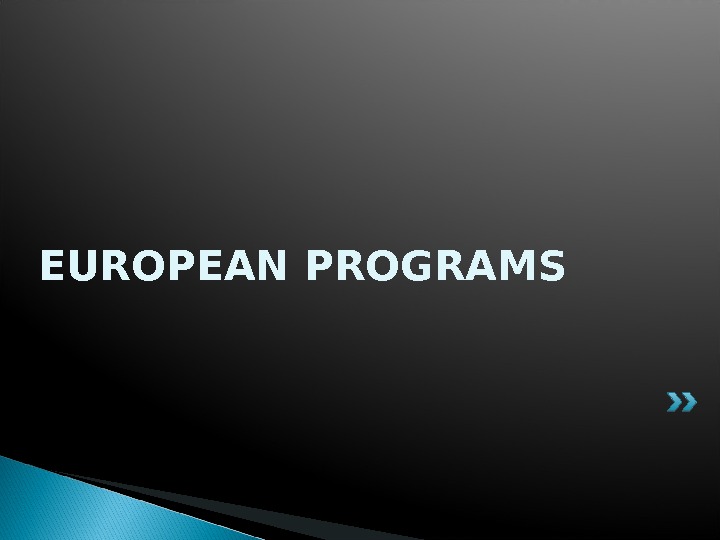
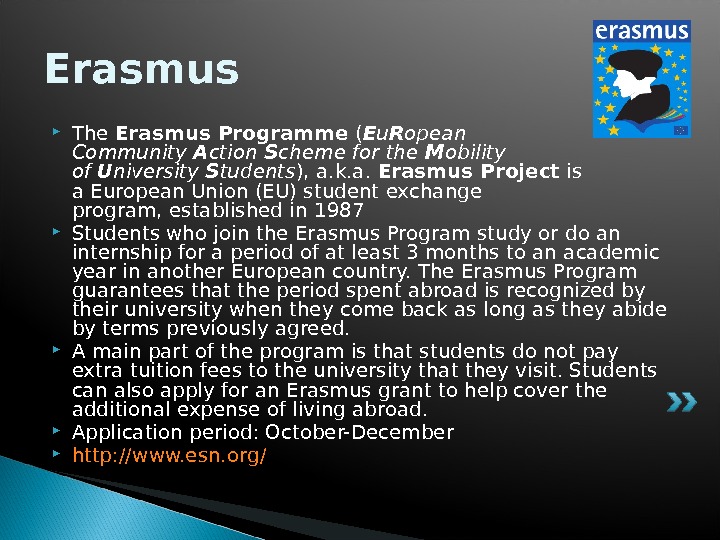
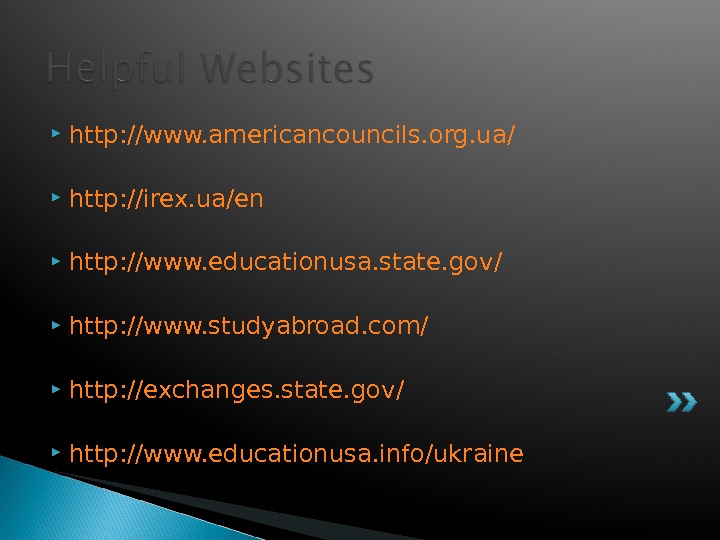
academic_exchanges.ppt
- Размер: 2 Mегабайта
- Количество слайдов: 25
Описание презентации Elizabeth Walsh October 2012 Cherkasy State Business College по слайдам
 Elizabeth Walsh October 2012 Cherkasy State Business College
Elizabeth Walsh October 2012 Cherkasy State Business College
 AMERICAN PROGRAMS
AMERICAN PROGRAMS
 High School Programs
High School Programs
 U. S. government sponsored program for secondary school students from 10 of the newly independent states The program provides scholarship funding for students to travel to the U. S. , attend a U. S. high school for a full academic year, and live with a U. S. host family To apply, you must be 15 -17 years old and fall within a certain birth-date
U. S. government sponsored program for secondary school students from 10 of the newly independent states The program provides scholarship funding for students to travel to the U. S. , attend a U. S. high school for a full academic year, and live with a U. S. host family To apply, you must be 15 -17 years old and fall within a certain birth-date
 This year from Ukraine about 260 students will go on FLEX Testing for FLEX in Ukraine takes place starting in September in most oblast centers Students participate in 3 rounds of testing and finalists are selected by a commission in Washington D. C.
This year from Ukraine about 260 students will go on FLEX Testing for FLEX in Ukraine takes place starting in September in most oblast centers Students participate in 3 rounds of testing and finalists are selected by a commission in Washington D. C.
 The primary goal of FLEX is improving mutual understanding between our countries and allowing young citizens of Eurasia to have the opportunity to observe and experience the American system of government Since 1993, over 17, 000 young citizens from Eurasia have participated in FLEX and have returned to their countries imbued with a new enthusiasm and desire to help others and share their newly acquired experiences and knowledge for the betterment of their home communities and countries
The primary goal of FLEX is improving mutual understanding between our countries and allowing young citizens of Eurasia to have the opportunity to observe and experience the American system of government Since 1993, over 17, 000 young citizens from Eurasia have participated in FLEX and have returned to their countries imbued with a new enthusiasm and desire to help others and share their newly acquired experiences and knowledge for the betterment of their home communities and countries
 Undergraduate Programs
Undergraduate Programs
 Who is an “Undergraduate Student”? An undergraduate student in the U. S. is seeking one of two higher education degrees- an associate’s degree or a bachelor’s degree The associate’s degree typically takes two years to complete and is offered at two-year colleges known as “community colleges” or “junior colleges” The bachelor’s degree usually takes four years to complete and is offered at degree-granting institutions known as colleges or universities U. S. undergraduate education is based on the concept of liberal arts and sciences. You can take classes in a wide variety of subjects in addition to your major field of study
Who is an “Undergraduate Student”? An undergraduate student in the U. S. is seeking one of two higher education degrees- an associate’s degree or a bachelor’s degree The associate’s degree typically takes two years to complete and is offered at two-year colleges known as “community colleges” or “junior colleges” The bachelor’s degree usually takes four years to complete and is offered at degree-granting institutions known as colleges or universities U. S. undergraduate education is based on the concept of liberal arts and sciences. You can take classes in a wide variety of subjects in addition to your major field of study
 Studying as an Undergraduate Student in the U. S. -Do It On Your Own Research your options ◦ Define your priorities ◦ Research and narrow your choices ◦ Identify types and sources of financial aid ◦ Make a short list of your top choices ◦ Prepare for standardized tests Complete your application Finance your studies Apply for your student visa ◦ What are the different types of visas for non-U. S. citizens who study in the United States? ◦ F-1 Student Visa. The most common visa for those who want to study in the United States. It is for individuals who want to study at an accredited U. S. college or university or study English at a university or intensive English language institute. ◦ J-1 Exchange Visa. This visa is for people who will be participating in an exchange program, including those programs that provide high school and university study. ◦ M-1 Student Visa. This visa is for those who will be engaged in non-academic or vocational study or training in the United States. Prepare for your departure
Studying as an Undergraduate Student in the U. S. -Do It On Your Own Research your options ◦ Define your priorities ◦ Research and narrow your choices ◦ Identify types and sources of financial aid ◦ Make a short list of your top choices ◦ Prepare for standardized tests Complete your application Finance your studies Apply for your student visa ◦ What are the different types of visas for non-U. S. citizens who study in the United States? ◦ F-1 Student Visa. The most common visa for those who want to study in the United States. It is for individuals who want to study at an accredited U. S. college or university or study English at a university or intensive English language institute. ◦ J-1 Exchange Visa. This visa is for people who will be participating in an exchange program, including those programs that provide high school and university study. ◦ M-1 Student Visa. This visa is for those who will be engaged in non-academic or vocational study or training in the United States. Prepare for your departure
 UGRAD The Global Undergraduate Exchange Program (Global UGRAD) provides opportunities for current first-, second-, and third-year undergraduate students to spend one academic year of non-degree study in a US university or community college. Participants are selected through an open, merit-based competition. http: // www. youtube. com/watch? v =YU 9 k. Uotlw. EM
UGRAD The Global Undergraduate Exchange Program (Global UGRAD) provides opportunities for current first-, second-, and third-year undergraduate students to spend one academic year of non-degree study in a US university or community college. Participants are selected through an open, merit-based competition. http: // www. youtube. com/watch? v =YU 9 k. Uotlw. EM
 UGRAD All fellows will: ◦ Attend classes full-time for one academic year; ◦ Perform a minimum of 20 hours of community service in their host city during the first semester; and ◦ Complete a part-time internship during their second semester. ◦ Students in their first-year at the time of application will live with host families or in dormitories and will be enrolled in two-year community colleges. Students in their second- or third-year at the time of application will live in dormitories at four-year colleges and universities. J-1 Visa Support The fellowship is fully funded and provides: ◦ Round-trip airfare from fellow’s home cityto host institution in the United States; ◦ Accident and sickness insurance; ◦ Tuition and mandatory university fees; ◦ Room and board (housing and meals); ◦ Small incidentals allowance; ◦ Limited allowance for books; ◦ A wide variety of alumni networking and training opportunities.
UGRAD All fellows will: ◦ Attend classes full-time for one academic year; ◦ Perform a minimum of 20 hours of community service in their host city during the first semester; and ◦ Complete a part-time internship during their second semester. ◦ Students in their first-year at the time of application will live with host families or in dormitories and will be enrolled in two-year community colleges. Students in their second- or third-year at the time of application will live in dormitories at four-year colleges and universities. J-1 Visa Support The fellowship is fully funded and provides: ◦ Round-trip airfare from fellow’s home cityto host institution in the United States; ◦ Accident and sickness insurance; ◦ Tuition and mandatory university fees; ◦ Room and board (housing and meals); ◦ Small incidentals allowance; ◦ Limited allowance for books; ◦ A wide variety of alumni networking and training opportunities.
 Graduate Programs
Graduate Programs
 Who is a “Graduate Student”? More than 1, 000 U. S. colleges and universities offer programs leading to a graduate degree a wide range of fields. The two main graduate degrees in the United States are the master’s degree and the doctoral degree. Both degrees involve a combination of research and coursework. Graduate education is characterized by in-depth training and specialized instruction. Compared with undergraduate programs, study and learning are more self-directed at the graduate level. The Master’s Degree provides education in a specialized branch or field. It may be academic (Master of Arts-M. A. or Master of Science-M. S. ), or it may be professional (Master of Business Administration-M. B. A. , Master of Fine Arts-M. F. A. , Master of Social Work-M. S. W. or Master of Education-MEd) The Doctoral Degree is designed to prepare students for college faculty and research scholar positions, or for other careers that require advanced knowledge and research skills
Who is a “Graduate Student”? More than 1, 000 U. S. colleges and universities offer programs leading to a graduate degree a wide range of fields. The two main graduate degrees in the United States are the master’s degree and the doctoral degree. Both degrees involve a combination of research and coursework. Graduate education is characterized by in-depth training and specialized instruction. Compared with undergraduate programs, study and learning are more self-directed at the graduate level. The Master’s Degree provides education in a specialized branch or field. It may be academic (Master of Arts-M. A. or Master of Science-M. S. ), or it may be professional (Master of Business Administration-M. B. A. , Master of Fine Arts-M. F. A. , Master of Social Work-M. S. W. or Master of Education-MEd) The Doctoral Degree is designed to prepare students for college faculty and research scholar positions, or for other careers that require advanced knowledge and research skills
 Muskie Program The Edmund S. Muskie Graduate Fellowship Program brings emerging leaders in key professional fields from Eurasia to the United States for one to two years of graduate study at institutions across the United States. Through their academic studies, internships, and community service, fellows come in close contact with Americans and make direct connections with American universities, businesses, social-service organizations, schools, and other institutions, allowing them to develop a deeper understanding of U. S. values and ideals, such as democratic leadership.
Muskie Program The Edmund S. Muskie Graduate Fellowship Program brings emerging leaders in key professional fields from Eurasia to the United States for one to two years of graduate study at institutions across the United States. Through their academic studies, internships, and community service, fellows come in close contact with Americans and make direct connections with American universities, businesses, social-service organizations, schools, and other institutions, allowing them to develop a deeper understanding of U. S. values and ideals, such as democratic leadership.
 Muskie Program-Project Activities Graduate Study: Muskie fellows enroll in full-time non-degree or degree programs at IREX’s partner universities, enriching graduate classrooms with new international perspectives and valuable professional experience on the ground. Eligible fields of study for the Muskie Program are business administration, economics, education, environmental management, international affairs, journalism and mass communication, law, library and information science, public administration, public health, and public policy. Community Service: All Muskie fellows give back at least 40 hours of service to their American host communities during the fellowship, completing a volunteer project related to their graduate field of study. Fellows provide skilled pro bono hours to mentor local small businesses, counsel homeowners on the brink of foreclosure, and develop partnerships between local schools and counterparts abroad. Internships: Following the first year of graduate study, Muskie fellows complete an internship in their professional field, gaining technical skills, bringing an international perspective to the workplace, and allowing employers to expand their connections abroad. Alumni Programming: Muskie alumni are eligible to apply for small grants to conduct community service projects, organize conferences or trainings, or release publications of scholarly work in their home countries.
Muskie Program-Project Activities Graduate Study: Muskie fellows enroll in full-time non-degree or degree programs at IREX’s partner universities, enriching graduate classrooms with new international perspectives and valuable professional experience on the ground. Eligible fields of study for the Muskie Program are business administration, economics, education, environmental management, international affairs, journalism and mass communication, law, library and information science, public administration, public health, and public policy. Community Service: All Muskie fellows give back at least 40 hours of service to their American host communities during the fellowship, completing a volunteer project related to their graduate field of study. Fellows provide skilled pro bono hours to mentor local small businesses, counsel homeowners on the brink of foreclosure, and develop partnerships between local schools and counterparts abroad. Internships: Following the first year of graduate study, Muskie fellows complete an internship in their professional field, gaining technical skills, bringing an international perspective to the workplace, and allowing employers to expand their connections abroad. Alumni Programming: Muskie alumni are eligible to apply for small grants to conduct community service projects, organize conferences or trainings, or release publications of scholarly work in their home countries.
 Professional Degree Programs Professional degree programs that lead to licensure in specialized fields such as law or medicine are also available in the United States. For most of these programs, a bachelor’s degree in a specific field is not required; however, some programs do require certain prerequisite coursework. For example, a student entering medical school may have a bachelor’s degree in religion, but the student will also have taken a significant number of prerequisite courses in the biological sciences, chemistry, mathematics, and behavioral and social sciences.
Professional Degree Programs Professional degree programs that lead to licensure in specialized fields such as law or medicine are also available in the United States. For most of these programs, a bachelor’s degree in a specific field is not required; however, some programs do require certain prerequisite coursework. For example, a student entering medical school may have a bachelor’s degree in religion, but the student will also have taken a significant number of prerequisite courses in the biological sciences, chemistry, mathematics, and behavioral and social sciences.
 English Language Programs
English Language Programs
 What are ESL Programs? English as a Second Language, or ESL, programs offer international students the chance to learn English or improve their English language skills. Courses are offered at hundreds of U. S. educational institutions and range from academic English for university-bound students to language and culture courses for travelers. Intensive English Programs (IEPs) ◦ Can be taken for personal or professional reasons and not for academic credit. ◦ May also be taken to prepare for U. S. college or university admissions, and some IEPs offer «bridge programs» that help students transfer into an academic program. ◦ May include classes designed for any level of English proficiency. ◦ Usually require 20– 30 hours per week of intensive English language study. College American Language and Culture Program ◦ Are usually taken for academic credit to prepare for, or as part of, a U. S. college or university degree program. ◦ Often require an intermediate or advanced level of English language proficiency before enrollment. ◦ May be taken to improve a specific academic skill, such as reading, writing, or grammar. ◦ Will assist with adjustment to U. S. culture and campus life.
What are ESL Programs? English as a Second Language, or ESL, programs offer international students the chance to learn English or improve their English language skills. Courses are offered at hundreds of U. S. educational institutions and range from academic English for university-bound students to language and culture courses for travelers. Intensive English Programs (IEPs) ◦ Can be taken for personal or professional reasons and not for academic credit. ◦ May also be taken to prepare for U. S. college or university admissions, and some IEPs offer «bridge programs» that help students transfer into an academic program. ◦ May include classes designed for any level of English proficiency. ◦ Usually require 20– 30 hours per week of intensive English language study. College American Language and Culture Program ◦ Are usually taken for academic credit to prepare for, or as part of, a U. S. college or university degree program. ◦ Often require an intermediate or advanced level of English language proficiency before enrollment. ◦ May be taken to improve a specific academic skill, such as reading, writing, or grammar. ◦ Will assist with adjustment to U. S. culture and campus life.
 Fulbright-Foreign Language Teaching Assistant (FLTA) The Fulbright Foreign Language Teaching Assistant (FLTA) Program enables young educators to refine their teaching skills, increase their English language proficiency and extend their knowledge of the cultures and customs of the United States while engaging in non-degree studies at accredited post-secondary U. S. educational institutions. Along with theirstudies, FLTAs teach language courses, supervise language labs and lead language table discussions. FLTAs may serve as an instructor of a foreign language class or have a purely teaching assistant role. FLTAs may also act as resource persons in conversation groups, cultural representatives, attendants in language laboratories, coordinators of extra-curricular activities, guest speakers in civilization courses, head’s of language clubs, houses, tables and much more.
Fulbright-Foreign Language Teaching Assistant (FLTA) The Fulbright Foreign Language Teaching Assistant (FLTA) Program enables young educators to refine their teaching skills, increase their English language proficiency and extend their knowledge of the cultures and customs of the United States while engaging in non-degree studies at accredited post-secondary U. S. educational institutions. Along with theirstudies, FLTAs teach language courses, supervise language labs and lead language table discussions. FLTAs may serve as an instructor of a foreign language class or have a purely teaching assistant role. FLTAs may also act as resource persons in conversation groups, cultural representatives, attendants in language laboratories, coordinators of extra-curricular activities, guest speakers in civilization courses, head’s of language clubs, houses, tables and much more.
 Short-Term Programs
Short-Term Programs
 What do Short Term Programs Include? Exchange Programs ◦ Exchange programs in the United States offer opportunities to live, learn, and enrich yourself in a diversity of cultural settings. Have you completed secondary school or an undergraduate degree? Or are you pursuing an undergraduate or graduate degree? ◦ Many U. S. universities allow students to take degree-level courses without enrolling in a full degree program. Non-Degree Programs ◦ Have you completed secondary school or an undergraduate degree? Or are you pursuing an undergraduate or graduate degree? ◦ Many U. S. universities allow students to take degree-level courses without enrolling in a full degree program. Internships ◦ As a way to provide a true learning experience for international students that reinforces their academic studies, the U. S. Department of State created an internship category within the Exchange Visitor Program.
What do Short Term Programs Include? Exchange Programs ◦ Exchange programs in the United States offer opportunities to live, learn, and enrich yourself in a diversity of cultural settings. Have you completed secondary school or an undergraduate degree? Or are you pursuing an undergraduate or graduate degree? ◦ Many U. S. universities allow students to take degree-level courses without enrolling in a full degree program. Non-Degree Programs ◦ Have you completed secondary school or an undergraduate degree? Or are you pursuing an undergraduate or graduate degree? ◦ Many U. S. universities allow students to take degree-level courses without enrolling in a full degree program. Internships ◦ As a way to provide a true learning experience for international students that reinforces their academic studies, the U. S. Department of State created an internship category within the Exchange Visitor Program.
 Internships In 2007, the U. S. Department of State added an internship category to the Exchange Visitor Program. The goal is to provide participants with broad exposure to U. S. culture and society, and to foster greater appreciation among Americans for the participant’s home country. Internship participants must have sufficient English language ability to participate effectively in the internship AND: ◦ Must be currently enrolled in and pursuing studies at a foreign degree- or certificate-granting post-secondary academic institution outside the United States. OR ◦ Must have graduated from a foreign degree- or certificate-granting post-secondary academic institution outside the United States no more than 12 months prior to his or her exchange visitor program start date.
Internships In 2007, the U. S. Department of State added an internship category to the Exchange Visitor Program. The goal is to provide participants with broad exposure to U. S. culture and society, and to foster greater appreciation among Americans for the participant’s home country. Internship participants must have sufficient English language ability to participate effectively in the internship AND: ◦ Must be currently enrolled in and pursuing studies at a foreign degree- or certificate-granting post-secondary academic institution outside the United States. OR ◦ Must have graduated from a foreign degree- or certificate-granting post-secondary academic institution outside the United States no more than 12 months prior to his or her exchange visitor program start date.
 EUROPEAN PROGRAMS
EUROPEAN PROGRAMS
 Erasmus The Erasmus Programme ( E u R opean Community A ction S cheme for the M obility of U niversity S tudents ), a. k. a. Erasmus Project is a. European Union(EU)student exchange program, established in 1987 Students who join the Erasmus Program study or do an internship for a period of at least 3 months to an academic year in another European country. The Erasmus Program guarantees that the period spent abroad is recognized by their university when they come back as long as they abide by terms previously agreed. A main part of the program is that students do not pay extra tuition fees to the university that they visit. Students can also apply for an Erasmus grant to help cover the additional expense of living abroad. Application period: October-December http: // www. esn. org /
Erasmus The Erasmus Programme ( E u R opean Community A ction S cheme for the M obility of U niversity S tudents ), a. k. a. Erasmus Project is a. European Union(EU)student exchange program, established in 1987 Students who join the Erasmus Program study or do an internship for a period of at least 3 months to an academic year in another European country. The Erasmus Program guarantees that the period spent abroad is recognized by their university when they come back as long as they abide by terms previously agreed. A main part of the program is that students do not pay extra tuition fees to the university that they visit. Students can also apply for an Erasmus grant to help cover the additional expense of living abroad. Application period: October-December http: // www. esn. org /
 http : // www. americancouncils. org. ua / http : //irex. ua/en http: // www. educationusa. state. gov / http: // www. studyabroad. com / http: // exchanges. state. gov / http: // www. educationusa. info/ukraine
http : // www. americancouncils. org. ua / http : //irex. ua/en http: // www. educationusa. state. gov / http: // www. studyabroad. com / http: // exchanges. state. gov / http: // www. educationusa. info/ukraine

